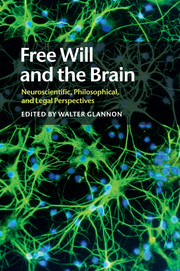Book contents
- Free Will and the Brain
- Free Will and the Brain
- Copyright page
- Contents
- Preface
- Contributors
- Part I Introduction
- Part II Conceptual issues
- Part III Mental capacities and disorders of the will
- 5 Being free by losing control: what obsessive-compulsive disorder can tell us about free will
- 6 Psychopathy and free will from a philosophical and cognitive neuroscience perspective
- 7 How mental disorders can compromise the will
- 8 Are addicted individuals responsible for their behaviour?
- 9 Assessment and modification of free will via scientific techniques: two challenges
- Part IV Neural circuitry and modification of the will
- Part V Legal implications of neuroscience
- Index
- References
7 - How mental disorders can compromise the will
from Part III - Mental capacities and disorders of the will
Published online by Cambridge University Press: 05 October 2015
- Free Will and the Brain
- Free Will and the Brain
- Copyright page
- Contents
- Preface
- Contributors
- Part I Introduction
- Part II Conceptual issues
- Part III Mental capacities and disorders of the will
- 5 Being free by losing control: what obsessive-compulsive disorder can tell us about free will
- 6 Psychopathy and free will from a philosophical and cognitive neuroscience perspective
- 7 How mental disorders can compromise the will
- 8 Are addicted individuals responsible for their behaviour?
- 9 Assessment and modification of free will via scientific techniques: two challenges
- Part IV Neural circuitry and modification of the will
- Part V Legal implications of neuroscience
- Index
- References
- Type
- Chapter
- Information
- Free Will and the BrainNeuroscientific, Philosophical, and Legal Perspectives, pp. 125 - 145Publisher: Cambridge University PressPrint publication year: 2015



